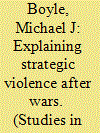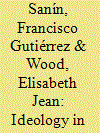| Srl | Item |
| 1 |
ID:
087395


|
|
|
|
|
| Publication |
2009.
|
| Summary/Abstract |
This article aims to explain why strategic violence against targeted groups emerges after some civil wars but not others. It argues that when one side has captured the coercive apparatus of the state, and the potentially hostile losing side is less vulnerable to predation, the leaders of the victorious group can reward their domestic constituents and conduct in-group policing to prevent opportunistic violence. But when an armed group fails to achieve state capture and the losing side remains in a vulnerable position relative to its former enemies, neither side can credibly guarantee their domestic allies a share of the resources of the state or conduct effective in-group policing of potential extremists. Using Kosovo and East Timor as case studies, this article shows that in these cases, strategic violence is less a function of a concerted attempt to spoil a settlement than of the internal bargaining of new splinter groups.
|
|
|
|
|
|
|
|
|
|
|
|
|
|
|
|
| 2 |
ID:
128868


|
|
|
|
|
| Publication |
2014.
|
| Summary/Abstract |
How important is ideology for the analysis of civil war? In contrast to literature that neglects ideology in its emphasis on structural variables or situational incentives, this article argues for the recognition of its essential role in the functioning of armed groups if they are to explain observed variation in armed group behavior. For example, sidelining ideology leaves major phenomena unexplained, including both mass killing and restraint in violence against civilians. Ideology is defined as a set of more or less systematic ideas that identify a constituency, the objectives pursued on behalf of that group, and a program of action (perhaps only vaguely defined). Ideology matters in two ways. First, it has instrumental value for armed groups, socializing combatants with heterogeneous motivations into a coherent group, dampening principal-agent problems, prioritizing competing goals, and coordinating external actors including civilians. Ideologies differ in the kind of institutions and strategies they prescribe for meeting these challenges and in the extent to which they do so. Yet this first approach is incomplete, as ideology has more than instrumental value. Members of some armed groups act on normative commitments in ways not reducible to instrumental reasoning, and some groups constrain their strategic choices for ideological reasons, often normative concerns prescribed by their ideology. Some groups, for example, engage in restraint, declining to use violence though it would have strategic benefit. The conclusion lays out a twin-fold research agenda: a 'weak program' that analyzes the instrumental adoption of ideology and a 'strong program' that explores normative commitments based on particular ideologies and on social preferences.
|
|
|
|
|
|
|
|
|
|
|
|
|
|
|
|